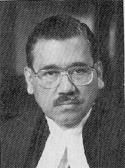Aziz Mushabber Ahmadi
Aziz Mushabber Ahmadi | |
|---|---|
 | |
| 26th Chief Justice of India | |
| In office 25 October 1994 – 24 March 1997 | |
| Nominated by | none (per convention as he was the senior most judge) |
| Appointed by | Shankar Dayal Sharma |
| Preceded by | M. N. Venkatachaliah |
| Succeeded by | J. S. Verma |
| Chancellor, Aligarh Muslim University[1] | |
| In office 2003–2010 | |
| Preceded by | Syedna Mohammed Burhanuddin |
| Succeeded by | Syedna Mufaddal Saifuddin |
| Personal details | |
| Born | 25 March 1932 Surat, Gujarat |
| Spouse(s) | Amena Ahmadi |
Aziz Mushabber Ahmadi (A. M. Ahmadi) (born 25 March 1932) was the 26th Chief Justice of India. After serving as a judge in the Gujarat High Court, Ahmadi was appointed judge to the Supreme Court in 1988. He was then elevated to the post of Chief Justice, and served from 1994 to 1997. He served as Chancellor at the Aligarh Muslim University for two terms.[1]
Judicial career[edit | edit source]
Having received Bachelor of Laws (LL.B.), Ahmadi joined the Bar in 1954. He eventually was appointed judge to the City Civil & Sessions Court of Ahmedabad in 1964. During this time, Ahmadi was appointed as Secretary of the Legal Affairs of the State of Gujarat in 1974, which soon led to an appointment as Judge of the Gujarat High Court in 1976.
As Judge of the Gujarat High Court, Ahmadi worked as Chairman of various advisory boards for:
- Conservation of Foreign Exchange and Prevention of Smuggling Activities
- Prevention of Black Marketing
- Maintenance of Supplies of Essential Commodities.
Also, he worked as a Member of the Ravi & Beas Waters Disputes Tribunal under the Rajiv-Longowal Settlement (Punjab Settlement).
Ultimately this led to an appointment as a Justice in the Supreme Court of India in December 1988. After six years, Ahmadi was appointed as Chief Justice of India in October 1994. Ahmadi became the third Muslim ever to serve as Chief Justice of India. After serving for two and a half years, he eventually stepped down to retire in March 1997.
Justice Ahmadi as Chief Justice of India on 13 September 1996 in a judgement authored by Justice Majmundar, in the UCC case, concurred with the view that the offence fell within the scope of section 304A,IPC and not within the scope of section 304 (II), IPC (culpable homicide not amounting to murder). Later the accused were tried user section 304A and were convicted and sentenced to 2 years punishment, further the NGO's raised a hue and cry and persuaded the government to file a curative petition in the Supreme Court which was decided by a 5 judge bench, which upheld the view taken by the Justice Ahmadi bench, and dismissed the petition.
Foreign recognition[edit | edit source]
Among many recognitions include:
- Member of the American Inn of Laws (May 1995)
- Honorary Master Bencher of the Honourable Society of Middle Temple, London (November 1996)
- Degree of Doctor of Laws (Honoris Causa) conferred on by University of Leicester, England. (July 1998)
- Nominated on International Committees:
- Human Rights violation in East Timor (United Nations)
- To assist the judiciary in Liberia (International Court of Justice)
- To review the state of relations between the judiciary, the legal profession and the executive and violation of human rights in Zimbabwe (International Bar Association)
Post-Retirement Career[edit | edit source]
Chancellor at Aligarh[edit | edit source]
After stepping down from the supreme court, Ahmadi became Chancellor at the renowned Aligarh Muslim University. In 2007, Ahmadi was re-elected Chancellor of Aligarh for three years.[2]
Since entering academics, he has been invited to speak at various universities and forums worldwide. Particularly in India, he has used his status to speak out on political issues such as minority rights.
Muslim Rights[edit | edit source]
Using his status, Ahmadi also continues to speak out for Muslim Rights in India, himself being a Muslim. Today he remains active in Indian politics as an advocate of minority rights, most recently through a book entitled A Guide To Uplift Minorities by the city-based Human Welfare Trust [1].
Putting emphasis on education, Ahmadi has frequently mentioned that the vast Muslim population of India is struggling to put children in school. He encourages federal and state governments to solve this problem, stating that, "the country simply cannot afford to have a certain percentage of population unable to contribute to the country's development.".[3]
Arbitrations[edit | edit source]
He is a sought after arbitrator in high value domestic as well as international arbitration matters.
References[edit | edit source]
- ↑ 1.0 1.1 amu.ac.in https://web.archive.org/web/20200517214338/https://www.amu.ac.in/pro.jsp?did=10065&lid=Chancellors. Archived from the original on 17 May 2020. Retrieved 18 May 2020.
{{cite web}}: Missing or empty|title=(help) - ↑ The Hindu: New Delhi News – ICRI to launch new course in clinical research – 1/25/07
- ↑ Keynote Address at the National Convention On Empowerment of Muslims through the Constitution of India
External links[edit | edit source]
- Muslims haven’t availed of constitutional rights: justice Ahmadi
- Book review: A guide to uplift minorities
| Legal offices | ||
|---|---|---|
| Preceded by Manepalli Narayana Rao Venkatachaliah |
Chief Justice of India 25 October 1994 – 24 March 1997 |
Succeeded by Jagdish Sharan Verma |